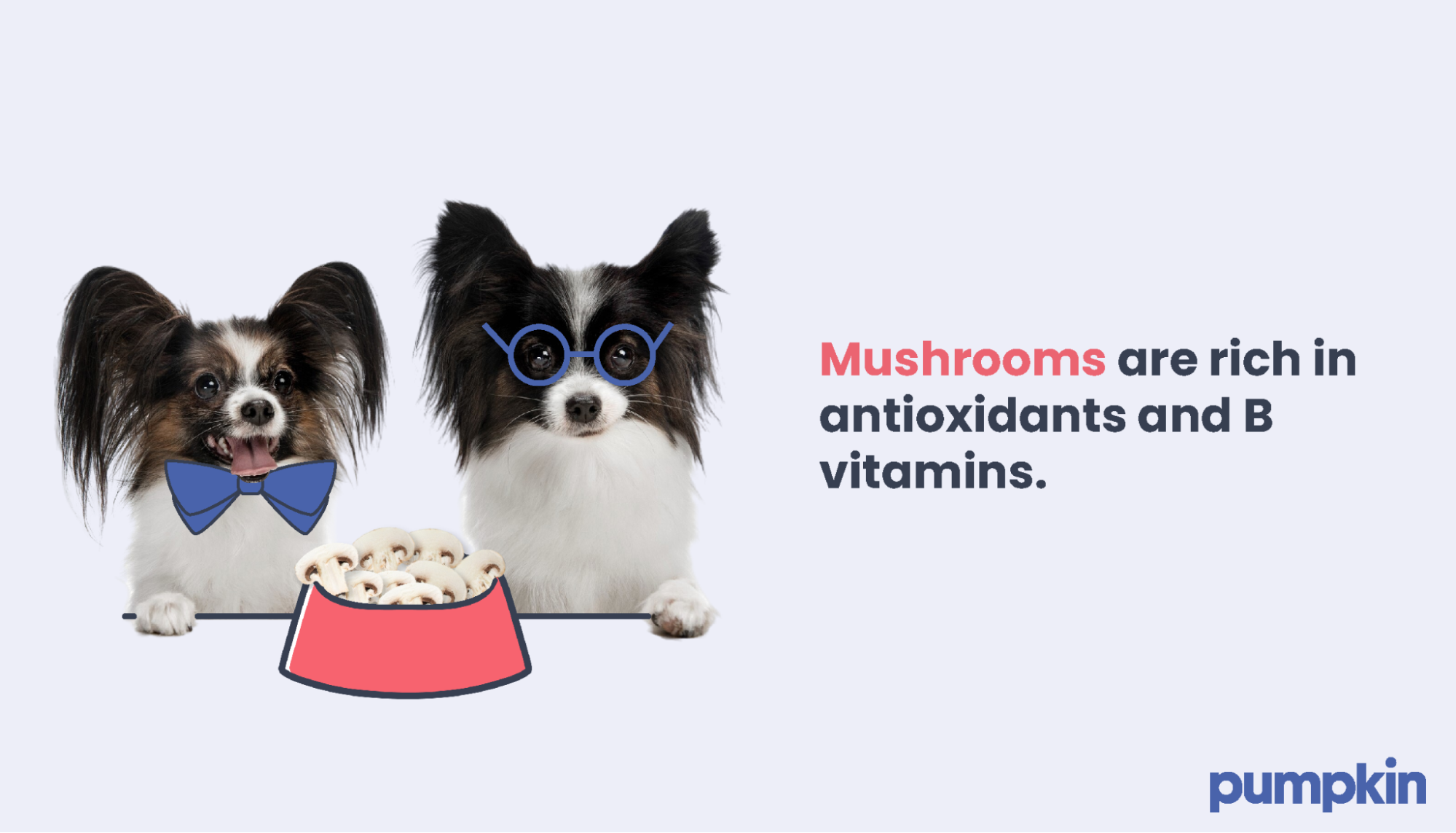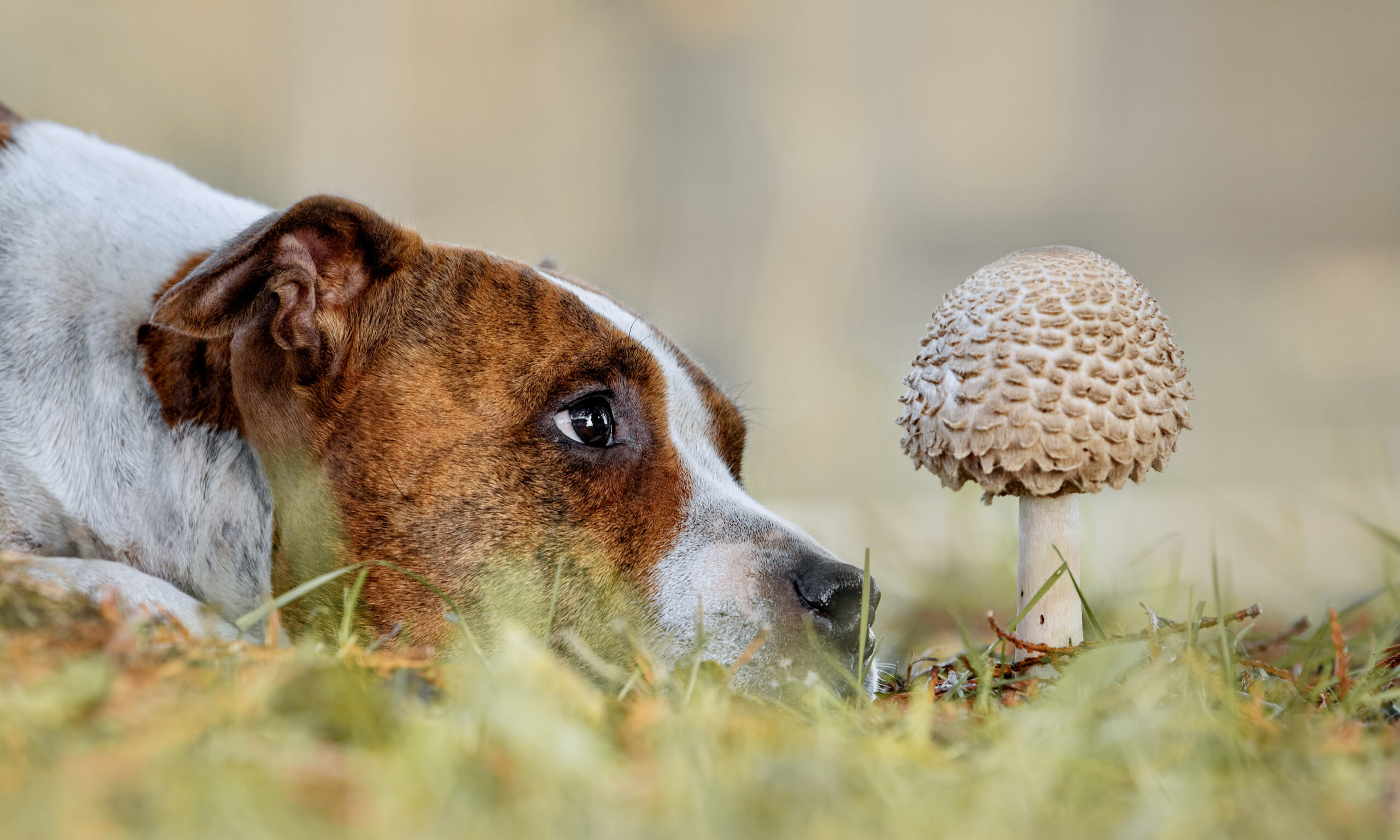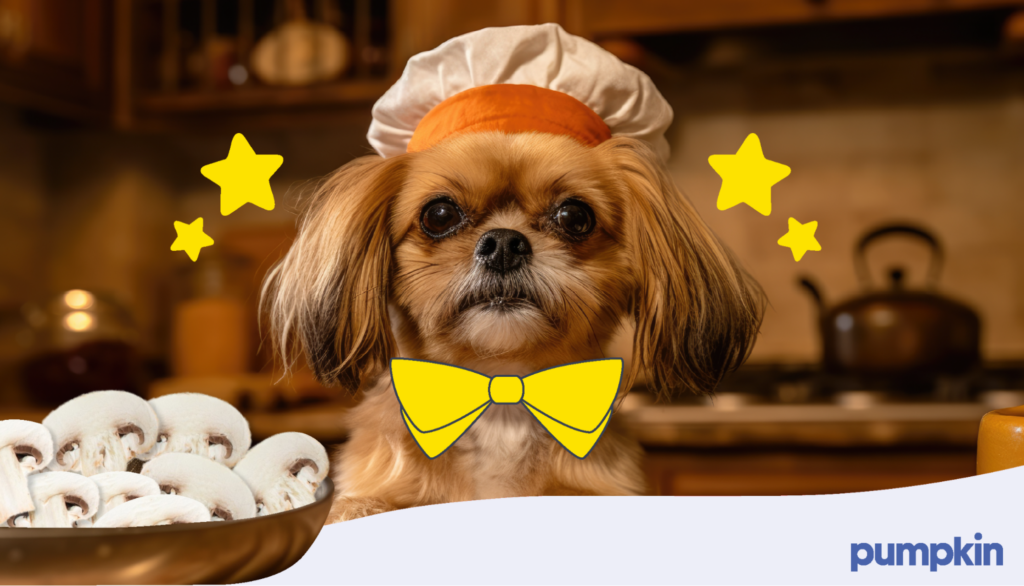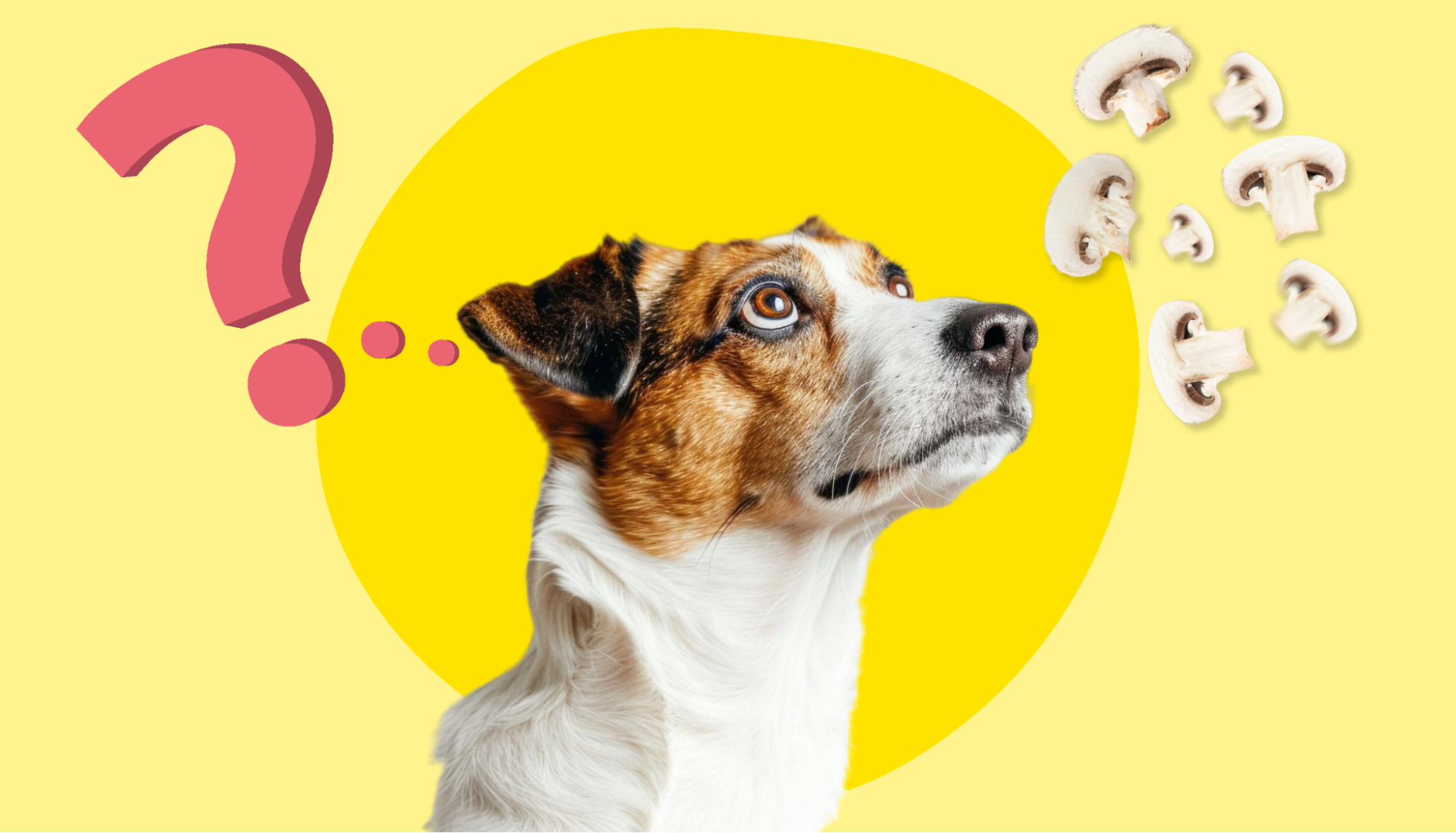Key Points:
- Dogs can eat some types of mushrooms, and you should always stick to plain, store-bought mushrooms.
- Safe and edible mushrooms provide dogs with nutrients like B vitamins, vitamin D, and fiber.
- Dogs should avoid wild mushrooms as many types are highly toxic; symptoms of mushroom toxicity include stomach upset, excessive salivation, seizures, and liver failure.
If you’re a dog parent with a pet that likes to eat everything under the sun, you might have panicked after catching them nibbling on a mushroom on your morning hike in the woods. Or maybe you’re simply exploring ways to add variety to your dog’s diet and are curious if your favorite mushrooms are safe.
Either way, the question is the same — can dogs eat mushrooms?
Dogs can safely eat most mushroom varieties you buy at the store, like button mushrooms or portabella mushrooms. However, many mushrooms are not safe for dogs, including some that are potentially lethal.
So, before giving your pup anything from the mushroom kingdom, make sure you know exactly which kinds of mushrooms are safe, always keep the portions in check, and avoid wild mushrooms altogether.
Read on to learn how mushrooms can affect your dog’s health, which kinds of mushrooms are safe, and the best ways to add edible fungus to your dog’s diet.
Are mushrooms good for dogs?
Your pooch should be getting all of their required nutrients from their regular dog food. So, strictly speaking, mushrooms aren’t a necessary part of any dog’s diet.
However, mushrooms do contain many nutrients that may be helpful for your dog, including:
- Vitamin B2, B3, B5, and folate: These B vitamins aid in improving energy and brain function.
- Vitamin D: An essential vitamin that keeps your dog’s bones strong.
- Selenium: This trace element keeps the immune system strong.
- Potassium: This electrolyte supports the health of the heart and nerves.
- Phosphorus: This mineral keeps the bones and teeth strong.
- Copper: This mineral supports blood circulation.

Mushrooms are also low in calories and fat and have no cholesterol or starches, making them a healthy option overall.
Health benefits of mushrooms for dogs
If you want to give your pup a boost of nutrition, a few mushroom slices are a good option. Just don’t share a slice of cheesy mushroom pizza or your world-famous garlic mushroom pasta, as the extra ingredients in your favorite mushroom dishes can harm your dog.
Here are some of mushrooms’ potential health benefits for your pup:
Support immune health
The antioxidants in mushrooms help the body defend itself from microbial infections. Mushrooms are also a good source of copper, which also helps keep the immune system strong and minimizes the risk of illness.
Reduce inflammation
Studies have shown mushrooms are very good sources of the antioxidants ergothioneine (ERGO) and glutathione, which have multiple health benefits, including reducing inflammation.
Improve digestive health
Mushrooms are rich in dietary fiber, which can support your pup’s digestion. They also contain protein, and the combination of protein and fiber can help prolong the feeling of fullness after meals.
How many mushrooms can a dog eat?
Like most treats, mushrooms should be given in moderation. Depending on your dog’s size, a small mushroom or a few slices of a large mushroom should be just fine. Remember, all extra foods, including mushrooms, should make up no more than 10% of your dog’s total calorie intake.
Can puppies have mushrooms?
Puppies can also safely eat mushrooms, with two caveats. First, they should already be eating solid food before they try mushrooms, and as with adult dogs, they should only eat store-bought mushrooms occasionally and in very small amounts. Start by offering small pieces and watching closely for signs of stomach upset.
Which mushrooms can my dog eat?
With so many different types of mushrooms, pet parents need to be extra careful when dealing with fungi. Let’s explore the types of mushrooms your dogs should avoid, and the types they can eat safely.
Which mushrooms are toxic to dogs?

Scientists estimate that there are at least 14,000 species of mushrooms, including about 2,100 species of edible mushrooms. However, 2-3% of mushrooms are poisonous, and 70-80 species are lethal when ingested. The ominously named “death cap mushroom” accounts for 90% of mushroom poisonings and deaths around the world. Because it can be easily mistaken for edible mushrooms, it’s especially dangerous, and it’s even responsible for killing popes and emperors.
Toxic mushrooms can be just as poisonous for dogs as they are for humans, so it’s important to be extra careful. In fact, to be safe, assume that all wild mushrooms are toxic, full stop. Ingestion of toxic mushrooms can cause anything from stomach upset to liver failure.
Pet Pro Tip: If you have a dog that is prone to ‘snacksidents’ – you should consider getting a dog insurance plan as soon as possible. It can help you afford the best care in the future by covering eligible vet bills for digestive illnesses, toxic ingestion, and more.
Which mushrooms are safe for dogs?
A lot of dog parents are rightly afraid of mushroom toxicity, but mushrooms can be a healthy part of a human and canine diet. Here are some non-toxic mushrooms that are perfectly safe for dogs to eat:
- Cremini mushrooms – Also known as button mushrooms, creminis can be brown or white.
- Chanterelle – These are golden-colored mushrooms with a trumpet shape.
- Portobello mushrooms – Loved for their rich flavor, these are large mushrooms with a thick cap.
- Morels – These mushrooms have a unique oblong shape and a dimpled cap.
- Oyster mushrooms – These delicate mushrooms have a light tan color and a wide cap.
- Porcini mushrooms – Porcinis are reddish-brown mushrooms with an intense flavor. These are usually available as dried mushrooms in the grocery store.
- Shiitakes – These mushrooms have a tan cap and a cream-colored stem.
All these edible mushrooms can be eaten dried, cooked, or fresh with little risk to your dog.
Can dogs eat wild mushrooms?
Fungi have never been more popular among humans, and many knowledgeable hobbyists enjoy trekking into the woods to gather wild mushrooms to eat. Technically, wild, edible mushrooms can be safe for dogs, but we think it’s too risky. Are there exceptions to this advice?
Are you a mycologist? Have you spent years harvesting wild mushrooms, trading tips with other mushroom hunters on forums, and studying dangerous look-alike mushrooms? Even if you answered yes to these questions, we still don’t recommend giving wild mushrooms to your pup. Why risk it?
If you find your curious dog sniffing at a mushroom while on a walk through the woods, redirect them before they take a bite.
Can dogs eat cooked mushrooms?
Grocery store mushrooms, cooked in a small amount of olive oil, can be a safe treat for your dog.

Cooking mushrooms enhances their flavor and makes them easier for your pup to digest.
You can also offer your dog broth with mushrooms, dried mushrooms, or canned mushrooms, as long as there are no added ingredients that could be harmful, such as sugar, onions, salt, or garlic.
Potential risks of mushrooms for dogs
The main risk of this edible fungi is mushroom toxicity. Generally, store-bought mushrooms are safe for dogs, but if your pup finds a wild one while you’re hiking in the woods, watch for symptoms of mushroom poisoning.
The most common symptoms of mushroom poisoning are:
- Excessive salivation
- Watery or teary eyes
- Excessive urination
- Weakness or lethargy
- Severe gastrointestinal upset, vomiting, or diarrhea
- Unsteady gait
- Tremors
- Seizures
The onset of mushroom toxicity symptoms in dogs can appear as quickly as 15 minutes after ingestion or take several hours to manifest. If you suspect your dog is suffering from mushroom poisoning, then it’s important to act fast.
What should I do if my dog eats a wild mushroom?
Dogs can be very sneaky snackers, so if you suspect your dog ate some wild mushrooms, assume they are poisonous. Eating wild mushrooms is never safe for your dog and can be life-threatening.
Call your veterinarian immediately and take your dog in for emergency support if recommended. The sooner you get your dog supportive care, the better the outcome.
If you have time, take a sample of the mushroom your dog ate for identification.
You can also call the ASPCA Poison Control Center for help if you aren’t sure what to do.
Supportive care for mushroom poisoning
If your dog has eaten toxic mushrooms, the first thing the vet will do is induce vomiting to help clear out the toxins. They might also administer activated charcoal, which binds to the toxins and helps safely remove them from the body.
To keep your dog from getting dehydrated, the vet will likely provide IV fluids. They’ll also give liver protectants and anti-nausea meds to support recovery.
How well and quickly your dog bounces back depends on the type of mushroom they ate, how much they ate, the size of the dog, how quickly you get them care, and their overall health. That’s why it’s super important to act quickly if you think they’ve eaten a wild mushroom.
The bottom line on dogs and mushrooms
Store-bought mushrooms, like chanterelle and button mushrooms, are generally safe and healthy for your dog as a treat or food topper. Moderation is always important when adding a new food to your dog’s daily diet, so remember the 10% rule for treats.
Start slow with any new food, offering a small amount to watch for any stomach upset. Because mushrooms are low in fat, calories, and carbs, they’re a smart choice for diabetic or overweight dogs.
Accidental toxic ingestion of wild mushrooms is a common occurrence for dogs, who are often too hungry for their own good. Pet insurance lets you visit the vet without worrying too much about the costs. Learn more about how pet insurance can help you afford vet care in the future.
- https://www.mdpi.com/2076-3417/12/16/8074
- https://www.ncbi.nlm.nih.gov/pmc/articles/PMC9291198/
- https://www.sciencedirect.com/topics/agricultural-and-biological-sciences/poisonous-fungi
- https://www.sciencedirect.com/science/article/abs/pii/S030881461730691X?via%3Dihub
- https://www.ncbi.nlm.nih.gov/pmc/articles/PMC4684115/
- https://www.ikonet.com/en/visualdictionary/static/us/edible_mushrooms
- https://nutritionsource.hsph.harvard.edu/food-features/mushrooms/
- https://www.britannica.com/story/7-of-the-worlds-most-poisonous-mushrooms
- https://www.myceliumsociety.com/2021/12/04/5-most-toxic-mushrooms-in-north-america.html
- https://www.chhs.colostate.edu/fsi/food-articles/produce/mushrooms/
- https://www.aspca.org/news/not-so-magic-mushrooms-tips-keep-your-pets-safe
- https://www.aspcapro.org/resource/hallucinogenic-mushroom-toxicosis-animals
- https://www.cnn.com/2023/12/29/health/mushrooms-poisoning-foraging/index.html




